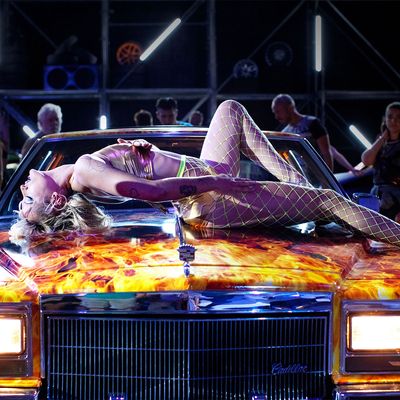
A concise summary of Titane would go something like this: A dancer with a penchant for violence goes on the run after a killing spree and seeks shelter in a firehouse by claiming a false identity. But that’s a bit like describing Mad Max: Fury Road as being about a group of women who escape from their traffickers and then return to reclaim the compound in which they were being held — technically accurate while doing nothing to convey the way the movie’s main aim is to melt your face off. And Titane, the second feature from Julia Ducournau, would like nothing more than to use the sheer force of its imagery to reduce its viewers to piles of bones and goo. The film is filled with shots of eroticized human bodies and even more eroticized car ones, the camera gliding over the contours and crevices of their mechanical underbellies as they glisten and drip in a way that’s downright obscene. In a sequence that’s already notorious, the film’s protagonist, Alexia (Agathe Rousselle), strides dripping out of the shower, as if summoned by the flame-covered Cadillac she’d been paid to gyrate on top of earlier that day, and climbs into its back seat to consummate their relationship in an indescribable act of vehicular relations.
Titane isn’t just car-fucking and self-mutilation, though those are the moments most intent on searing themselves permanently into its audiences’ eyeballs. The rest of the film is harder to get a handle on. Ducournau, who won the Palme d’Or for Titane at Cannes this year, launched her filmmaking career in 2016 with Raw, about a teenager (Garance Marillier) who’s dropped into a dizzying first semester of hazing, partying, and cannibalistic awakening at the brutalist veterinary school where her older sister studies. (Marillier turns up briefly as the one getting munched on in Titane.) Raw, despite all its flesh-gnawing, is still very much recognizable as a coming-of-age story. Titane, however, often feels like listening to someone describe a dream they had — less because of the movie’s logic, as spongy as that can be, than because you suspect you’re missing essential emotional context. As played by Rousselle, an androgynous beauty with a formidable glare, Alexia is a character of few words whose inner thoughts remain opaque in ways that can be frustrating.
In one of the film’s early scenes, Alexia spontaneously murders an intrusive admirer who hangs around after the car show she was working at and gets grabby when insisting on his affections. It’s unclear whether this act of dubious self-defense triggers something that’s been building up inside her or whether she’s killed before, but soon she’s hooking up with and then attacking a colleague in a sequence that goes all gruesome slapstick. Ducournau has a fondness for the extreme and, for all her resistance to the term, there are times when Titane feels primarily bent on provocation — like when Alexia, being hunted by the cops, goes about breaking her own nose as part of an attempt to pass herself off as a 17-year-old boy. But if some of Titane’s excursions into gruesomeness feel like they’re just there to make people squirm, others begin to accrue into a compelling treatise about longing for power over your own body.
Much of that longing has to do with gender, especially after Alexia discovers that her automotive encounter has left her pregnant. Despite making her living from her looks, she appears to have no personal attachment to them beyond the practical — chopping off her hair, maiming her face, and binding her breasts and swelling belly in an impulsive, unlikely plan to pass herself off as Adrien Legrand, a local boy who has been missing for a decade. When she’s presented to his father, Vincent (a magnificently sad-eyed Vincent Lindon), she looks very much like a 20-something woman with a broken nose and a brush cut, but the grief-haunted man insists, despite all evidence to the contrary, that she is Adrien, returned to him after all this time. She moves out of her world of feminine performance and into the hypermasculine sphere of the firehouse he’s captain of, placed among crew members so loyal they seem willing to go along with the charade.
Alexia does her best to fit in, not just out of self-preservation but also because the more time she spends with the tender, fragile Vincent, the more she seems to wish she could shed her previous self and just become Adrien for real, pouring herself into the space he left behind physically as well as emotionally. Titane’s most effective moments of body horror aren’t really stylized at all and have to do with the claustrophobia of being trapped in an unwanted pregnancy. If Titane is fueled by its characters’ desperate desire to have control over their own flesh, the way that Alexia’s body keeps threatening to expose her is its greatest source of panic. She tries, in an excruciating scene, to end it herself, and the camera lingers over the marks and sores left on Alexia’s skin by her daily attempts to mold her fecund female torso into the shape she wants. Meanwhile, Vincent stares morosely at his own uncooperative form in the mirror, trying to ward off time by injecting himself with what appear to be steroids and exploding in frustration when he can’t do the strength exercises he used to. This sense of fundamental betrayal resonates with Titane’s earliest images of a young Alexia getting a titanium plate in her skull after a car accident. At first, it seems like it just gave her an affinity with the mechanical, but as the film goes on, it feels more like a haunting promise that she could modify herself as readily as any automobile.
More Movie Reviews
- The Accountant 2 Can Not Be Taken Seriously
- Another Simple Favor Is So Fun, Until It Gets So Dumb
- Errol Morris Has Been Sucked Into the Gaping Maw of True Crime


